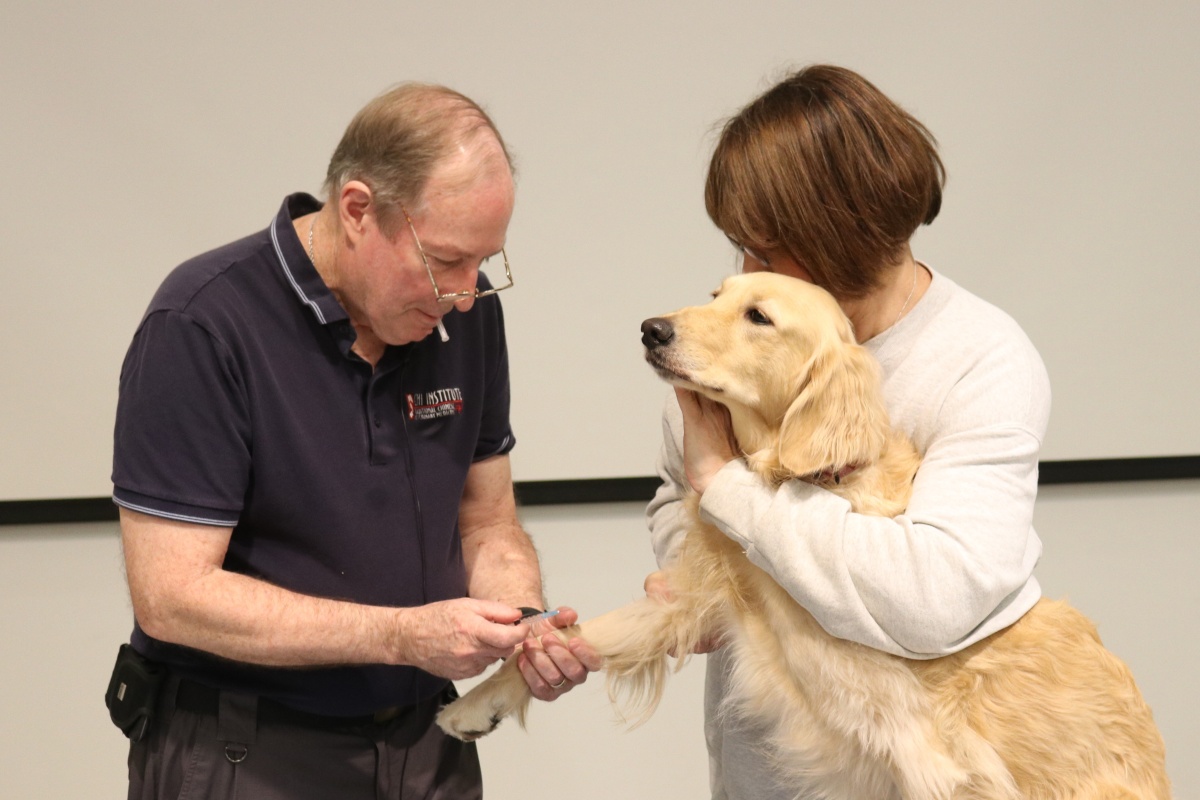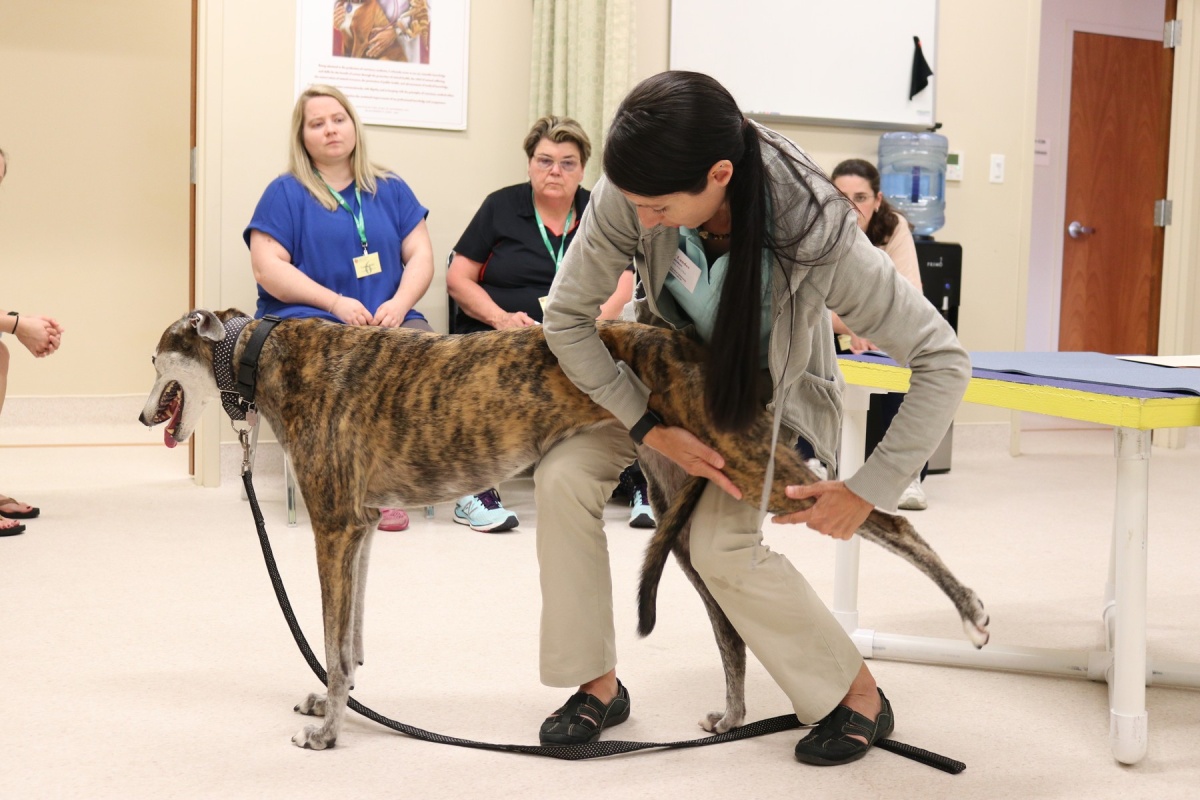
Course Overview
TCVM Diagnostics, Classical Points and Advanced Acupuncture Techniques (approved for 30 hours by AAVSB RACE) is a wet lab workshop offered to veterinary acupuncturists to expand their technical knowledge of acupuncture and to strengthen their TCVM diagnostic skills. Practical clinical application is the ultimate goal of this course; as such, wet labs make up more than half the on-site portion of the course and lectures are comprised of many demos and case studies. This version of the course is offered to small animal practitioners.

Main Topics
The course covers three major topics:
1. TCVM Diagnostic Skills
In any medical system, effective treatment hinges upon accurate and complete diagnosis. In Chinese medicine, this crucial process of diagnosis is referred to as Bian Zheng, where Bian means differentiation and identification and Zheng means a type of pattern or illness. Thus, TCVM diagnosis consists of identification of disease patterns, usually through palpation and through tongue and pulse readings. This course discusses the theory and techniques of Bian Zheng beyond what is covered in the Basic Acupuncture course and gives students the opportunity to practice palpation as well as tongue and pulse diagnosis on live small animal or equine patients.
2. Advanced Acupuncture Techniques
Advanced acupuncture topics covered in this course include auricular acupuncture, scalp acupuncture, electro-acupuncture, needling points around difficult locations (eyes, feet, abdomen, etc.) aqua-acupuncture, point embedding, pneumo-acupuncture and moxibustion. They will be covered in course lectures and demos and practiced by students in the wet labs.
3. Classical Acupoints
Today, the majority of veterinary acupuncture points were transposed from humans. However, some ancient books describing the acupoint locations developed specifically for equine and small animal species were preserved and are still used today. The locations and unique actions of these classical acupoints is another major topic of this advanced course.
Course Features
Expand your technical knowledge of acupuncture and to strengthen your TCVM diagnostic skills
12 hours of wet labs intensive hands-on learning in each session
Diagnose and treat real cases with the instructors and fellow veterinary acupuncturists
Learn from all the wet lab cases with discussion rounds
Satisfies the internship requirement of the CVA certification
TCVM Diagnostics, Classical Points and Advanced Acupuncture Techniques
Taught in English
For veterinarians & veterinary students only
32 RACE-approved CE hours
Prerequisites
Prerequisites
Completion of a veterinary acupuncture course provided by Chi or another equivalent institution is required for enrollment in this course. If currently enrolled in the Chi veterinary acupuncture course, you must complete at least through Session 4 before this course begins.
No semesters currently available
Instructors
Huisheng Xie
DVM, PhD
Dr. Xie has 42 years of clinical, teaching, and research experience in veterinary acupuncture and TCVM. He has trained over 11,000 veterinarians to practice TCVM worldwide. Dr. Xie’s education includes advanced training in veterinary medicine, veterinary acupuncture, and human acupuncture. Dr. Xie has authored 20 books and over 100 peer-reviewed papers. His textbooks, including Xie’s Veterinary Herbology, Xie’s Veterinary Acupuncture, and Traditional Chinese Veterinary Medicine-Fundamental Principles, have been used for TCVM training programs around the world. Dr. Xie continues to teach and develop educational courses and programs at Chi University, serves as a full clinical professor at the University of Florida’s College of Veterinary Medicine, and is an honorary professor at China Agricultural University, South China Agricultural University, and China Southwest University.
Read moreEnrollment options
No semesters currently available
Frequently Asked Questions
My acupuncture training is not through the Chi. Can I still attend this class?
Definitely! As long as you have completed an acupuncture course offered by the Chi U, or organization (IVAS, and etc.), you are welcome to register for this course.
I noticed that this course consists of both an online and an onsite component. Can I choose to just take the online component?
No. Registration for the course includes both the online and onsite portions of the course. Because this course is based heavily on the hands-on wet labs, the onsite portion is essential to the full understanding of the course material.
What's the format of the online lectures? How can I access them?
The online lectures are available streaming on the website. You will receive access instructions via email when the online portion begins. The lectures are available in two formats, one for faster internet connections and one for slower internet connections.
Do I have to pay the entire tuition when I register?
No, the course deposit of $100 will save your seat when you register. The class tuition is due 30 days before the class begins.